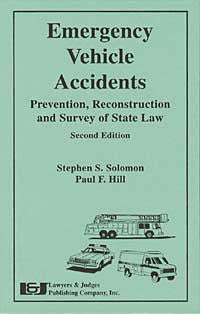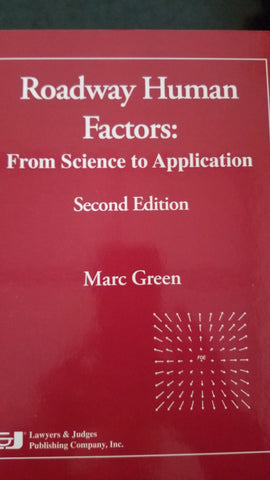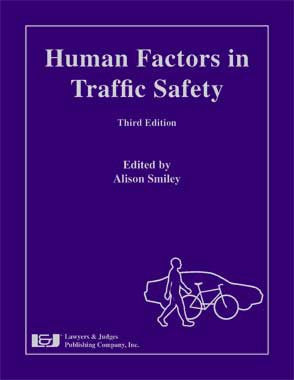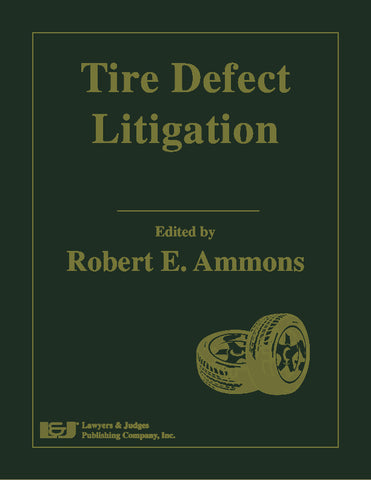
Emergency Vehicle Accidents
- Author: by Stephen S. Solomon, Paul F. Hill;
-
Contributors: George L. Ellis, James G. King, Robert J. Simpson, Steven Smyk
-
ISBN 10: 1-930056-46-X
-
ISBN 13: 978-1-930056-46-6
-
Copyright Date Ed: November 8, 2002
-
Pages: 638 pages
-
Binding Information: Hardcover
- Size: 7 ✕ 10 Inches (US)
What causes emergency vehicle accidents, especially with sirens and flashing lights in use? Where do they most often occur? What can emergency services personnel do to prevent these accidents? And, finally, what laws govern the use of these vehicles?
Stephen Solomon, an optometrist who has studied perceptual issues for over thirty years, has updated Part One of this complete guide to the safety issues surrounding emergency vehicles. You will learn about the problems with flashing lights, sirens, retroreflective tape, and the color of the vehicle. Many of these safety devices are used in a way that limits their effectiveness. Part Two of this book discusses the law of emergency vehicles on emergency runs.
The drivers of police vehicles, fire trucks, and ambulances have the right to ignore, with due caution and acting without reckless disregard, the rules of the road. This section provides a thorough study of the statutory and case law in the fifty states plus the District of Columbia.
This book is also available as an E-book. E-book price: $49.00 Click here to purchase and download:
TOPICS INCLUDE:
- Fluorescent, phosphorescent, and retroreflective materials
- Parked emergency vehicles--highway hazards
- Emergency services personnel as pedestrians
- Pertinent laws and cases
- Flashing lights, sirens and audible devices
- Why fire vehicle color is an issue of safety
- Emergency vehicle accident profiles
- The police chase
Table of Contents
Emergency Vehicle Accidents: Prevention and Reconstruction, Second Edition
Stephen S. Solomon, B.S., O.D. and Paul Hill, Esq.
Contributing Authors: George L. Ellis, M.D., FACEP, James G. King, Robert J. Simpson, Esq., Steven Smyk, Esq.
Preface
Acknowledgments
Part I: Human Factors and Emergency Vehicle Operation
Chapter 1: Introduction
Stephen S. Solomon, B.S., O.D.
Chapter 2: Construction of Emergency Vehicles
Stephen S. Solomon, B.S., O.D.
Chapter 3: Anatomy of the Eyes and Visual Performance
Stephen S. Solomon, B.S., O.D.
Chapter 4: Color Vision
Stephen S. Solomon, B.S., O.D.
Chapter 5: Flashing Lights
Stephen S. Solomon, B.S., O.D.
Chapter 6: Sirens and Audible Devices
Stephen S. Solomon, B.S., O.D.
Chapter 7: Why Fire Vehicle Color Is an Issue of Safety
Stephen S. Solomon and James G. King
Chapter 8: Fluorescent, Phosphorescent and Retroreflective Materials
Stephen S. Solomon, B.S., O.D.
Chapter 9: Emergency Response and Vehicle Operation
Stephen S. Solomon, B.S., O.D.
Chapter 10: Medical Control
George L. Ellis, M.D., FACEP
Part II: Accident Reconstruction and Litigation
Chapter 11: Emergency Vehicle Accident Profiles
Stephen S. Solomon, B.S., O.D.
Chapter 12: Accidents and Litigation--Case Studies
Stephen S. Solomon, B.S., O.D.
Chapter 13: Accident Analysis Considerations
Stephen S. Solomon, B.S., O.D.
Chapter 14: The Police Chase
Robert J. Simpson, Esq.
Chapter 15 Emergency Vehicle Accidents: Representing the Innocent Injured Bystander
Steven Smyk, Esq.
Chapter 16: Parked Emergency Vehicles: Highway Hazards
Stephen S. Solomon, B.S., O.D.
Chapter 17: Emergency Service Personnel as Pedestrians
Stephen S. Solomon, B.S., O.D.
Part III: Statues and Cases
Paul F. Hill, Esq.
Introductory Essay
State-by-State Brief Summary
State-by-State Statutes and Laws
Part IV: Appendices
Appendix I: Fire Apparatus Specifications-Pumper/Rescue
Appendix II: Revised Federal Specifications for Ambulances
Index to Appendix II
About the Authors
Index




